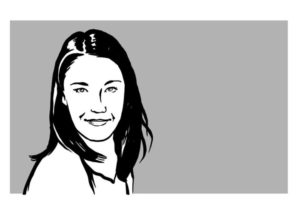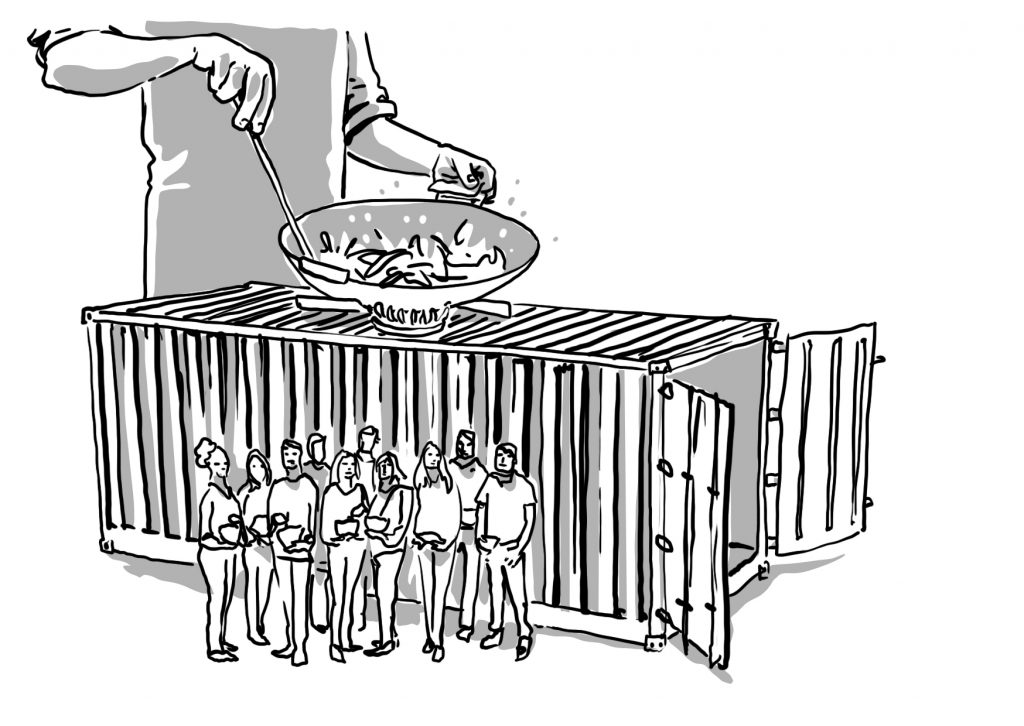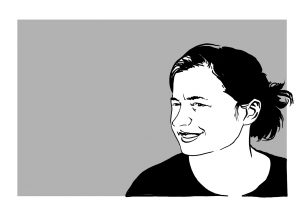Founded in 2015 by Hertie alumni Rabea Haß and her friend Jule Schröder, Kitchen on the Run organises cooking events for refugees and locals in a mobile shipping container. Rabea Haß on cooking, cultural exchange and being the co- founder of a social start-up.
TGP: You started Kitchen on the Run in 2015. Tell us a little about the project and the inspiration behind it.
We believe in people. We believe in the importance of face- to- face engagement and the unifying power of good food. We love to travel and we’re curious about meeting new people from all over the world. In 2012, [Kitchen on the Run co-founder] Jule and I had the idea of building a container bar on a ship and travelling the world- as a meeting point for people to connect, share stories, cultures and experience. We never actually realised this plan, but it wasn’t completely lost, either.
In 2015, more and more refugees starting coming to Europe and European nations were tearing themselves apart arguing about how to handle this flow of migrants. We felt we couldn’t just sit by. That’s why we started Kitchen on the Run.
We are ordinary citizens, ordinary Europeans, but we realised we could not longer watch this happen: right right-wing parties gaining prominence all over Europe, racist movements becoming more and more popular. So we decided to act.
TGP: What are the three key lessons you have learned launching the project? What were the main difficulties to overcome?
Firstly, it is amazing how many people (and organisations) are enthusiastic to support an idea if it is convincing and they feel that you are really serious about it. Secondly, just do it! Have confidence in your idea and get started! Thirdly, it is very easy to make people talk to each other – and food is a very good way to connect people.
We expected a lot of difficulties at the beginning, but none of them turned out to be true. However, we sometimes had to confront our own prejudices. Although we consider ourselves as very open- minded, we realised over and over again that we also think in stereotypes. Questioning yourself is not always easy.
At the same time, we were exposed to many, many stories – lots of them tragic, personal fates. Although people were mostly cheerful and enjoying themselves during the cooking, we saw so much disappointment, despair and lost biographies. Sometimes we felt quite helpless, sad and sometimes even a bit guilty.
TGP: What do you think sparked the active civil society response to refugees in 2015? Do you think this engagement is likely to continue?
I doubt that this commitment will continue in the same intensity. I think it was a unique wave of euphoria. And it’s easier to hand out toys and water than caring about integration. The process takes much, much longer and it can be years until you see what you change with your activities.
Nevertheless, I think there are still many volunteers who do a great job. It is not as visible anymore and it is many little things, where people care about each other. I just hope that the election campaigns will not use the topic of refugees to tear our societies apart…
Kitchen on Run wants to facilitate communication and help overcome prejudices. How do you avoid – quite literally – catering only to those who are fairly open- minded already?
Well, firstly, even those who are quite open-minded have often never met refugees personally. Even for them it is often a “aha” moment. Secondly, we try to attract people with good food and a great design. The container looks welcoming. Attracting people with good food and a nicely set table is kind of our hidden agenda. Thanks to the open space that the container provides and its location in public spaces, people walk by, stop and ask about the project. That’s how we get in contact…Of course it is hard to reach those who are on the far right. But I think we already have a great impact, if we reach out to those who have hidden fears and slight prejudices.
TGP: Last year, Kitchen on the Run stopped in Italy, France, the Netherlands, Sweden and Germany. Did you perceive any differences in the discourse about refugees in the respective countries?
Of course. Italy, for example, has had refugees for much longer and has had to face the problem more directly, so the discussion there is quite different. Refugees from Africa arrive at Italy’s borders almost every day. They’re part of everyday life, but they are not actively engaged in it. The people of southern Italy often live in precarious circumstances themselves. They have to deal with their own livelihood. Though there is hardly any open racism, there are only few offers for refugees to enter society.
The origins of the refugees varies a lot. In Italy and France we met mostly people from Western Africa, whereas in Germany, the Netherlands and Sweden it was mostly people from Syria, Iraq and Afghanistan. In Sweden almost every refugee has a university degree – you do not end up in Sweden by coincide, it is a very rational choice and the way up there is more costly then let’s say to Greece.
Despite these differences, the people we met have similar wishes: become part of the local society and live peacefully. They kept telling us, that this is only possible if you make friends with locals, get a job and can live independently!
TGP: You were cooking with over 2500 people from 70 countries in 2016- these numbers are quite impressive. What have you learned from Kitchen on the Run that you would like to see replicated at a policy level?
We have experienced that often it is enough to provide a space where people can meet. Once they start talking to each other, differences are getting smaller. But of course, this is only one of many, many pieces in the puzzle of integration. I think on the political level, each and every one of us needs to be encouraged to take part in the process of integration and contribute a small piece to this huge task.
What we’ve also learned: Waiting on papers, on a legal status, on the permission to work is one of the worst situations for human beings. There is hardly anything that causes that much disappointment, frustration and helplessness.
TGP: What’s next for Kitchen on the Run and what are the main challenges ahead?
Kitchen on the Run will travel through small German cities in 2017 and 2018. Our challenge is to make our activities sustainable, to create an intercultural dialogue in the cities that continues even when the container travels on.
And of course we are always thinking about how to reach those who are less open minded. We are currently working on this question with Design Thinking students and hope to find some good new approaches…
Rabea Haß is one of the co-founders of Kitchen on the Run. She holds a PhD in sociology and has worked many years in the field of applied research, e.g. at the Hertie School of Governance and the Centre for Social Investment at Heidelberg University. With a research focus on civil society, she knows how to assess the impact of non-profit projects and scale successful ideas.
 Klara Marie Schroeder is Executive Editor of The Governance Post and a second-year public policy student at the Hertie School of Governance.
Klara Marie Schroeder is Executive Editor of The Governance Post and a second-year public policy student at the Hertie School of Governance.

